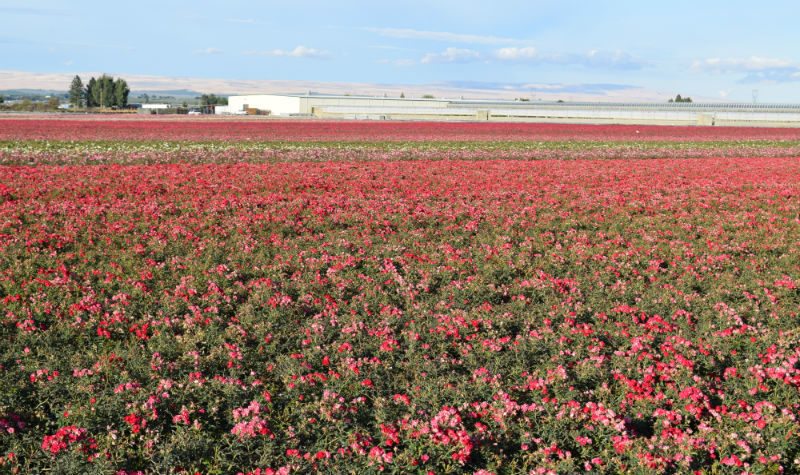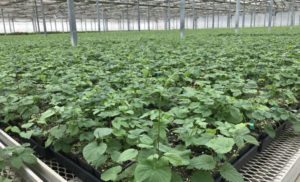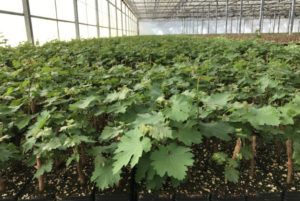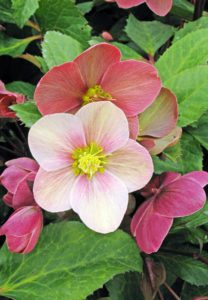
Cover Story — Unified Vision, Upward Growth
Skagit Horticulture at a glance
Locations: Three sites in Mt. Vernon, Washington; one site in Mabton, Washington; and one site in Watsonville, California
Total Growing Space: 650 acres

Key personnel: Mark Buchholz, president/CEO; Cathi Barta, CFO; Chris MacLaggan, sales manager; Mollie Hoare, operations manager; Darin Schlepp, planning/purchasing manager; Harold Henkel, logistics manager; Rose Vogel, human resources manager; Jerrin Victor, general manager, Mabton facility; Steve Tabor, general manager, Watsonville facility
Number of Employees: 400 year-round (800+ during peak season)
Business segments: Liners, retail-ready plants, specialty agriculture (hops/grapes), green roof sedums
Website: www.skagithort.com
In June 2016, news broke in the industry that Skagit Gardens had merged with Northwest Horticulture. To some, this may have come as a surprise as both companies were well-known providers of top-quality products. To others, the merge seemed to make sense as consolidation in the market had become more common and accepted throughout recent years.
In July of 2017, the news became official and the two companies merged together as one company, now known as Skagit Horticulture.
So, what happened? What led the companies to the merge? And what has the new Skagit Horticulture been up to since?
I had the opportunity to sit down with the senior leadership team at Skagit Horticulture’s Mt. Vernon facility to catch up on the business and find out what exciting projects they’ve been working on the past year and where they’re headed in the future.
The Merge
Founded by plantsman Jim Youngsman in 1966, Skagit Gardens began as a large wholesale nursery in Mt. Vernon, Washington, that serviced the independent garden center market. After years in the business, Youngsman decided to sell Skagit Gardens to a private investor group.
Meanwhile, down the road, Carl Loeb was launching Northwest Horticulture (known as Etera at the time), which focused on providing young and finished perennials to the market. Several years later, the business was sold to a private investor.

Skagit Gardens’ parent company began suffering from financial difficulties, shares Mark Buchholz, president and CEO of Skagit Horticulture. And as the company ultimately needed to be sold, the owner of Northwest Horticulture saw an opportunity to put the two businesses together.
Now about a full year into the merge, Skagit Horticulture finds itself in a great position with a dedicated team, multiple production sites and the ability to service various markets throughout the industry year-round.
The company’s current position didn’t necessarily come easy. “In the case of our merger, Skagit Gardens’ employees were obviously relieved that they all ended up still employed in the industry,” says Mollie Hoare, operations manager. “And there is the challenge of pulling two very different cultures together. Until you gain a rapport and a trust, there’s unrest.”
She says it took a good eight or so months for the employees to find themselves in a comfortable place and realize that the merge is going to work. Establishing a positive company culture is a primary objective to the leadership team at Skagit Horticulture.
Creating a Positive Culture
From the moment Skagit Gardens and Northwest Horticulture joined forces, building the best team possible with a nourishing and empowering company culture became a principal effort.
“We want to promote from within and create a culture of empowering folks to start thinking outside of the box,” says Rose Vogel, human resources manager.

The idea is to encourage employees to challenge themselves to move up the ladder in their careers within the company. “We’re attempting to place them in the best places where they fit and where they are the happiest.”
Another big effort is to retain seasonal employees. “We are fortunate to have a large core group of highly skilled employees. We supplement this with part time, seasonal employees.”
“What I’m trying to establish is that those seasonal folks come back year after year for consistent growth,” says Vogel. “We’ve already trained them, and they already know the positions. So we’re looking at bonus programs for those returning each season.”
Skagit Horticulture also organizes weekly raffles during peak season. Employees who aren’t tardy or don’t miss a shift qualify for the raffle and win various prizes like gift cards, movie tickets and dinner certificates. Vogel says this keeps the environment fun and encourages the peak-season employees to stick around and perform their best.
Business Structure
Another strong focus for Skagit Horticulture following the merger was to create the appropriate business structure, utilizing each production site and each employee to their fullest potential.
“In my mind, the critical need was to get everybody to focus on the business and to think like a company of business people,” says Buchholz. “The first part of that was to structure a strategic plan that resembles an income statement.”
Buchholz and his team first evaluated everything related to sales, followed by all production costs and then everything related to the office and administration below that.
“All of that activity resulted in a net bottom line,” continues Buchholz. “And that was helpful to us as we started to think about how we wanted to operate and structure the business. Our goal was that everyone understood how their actions impacted earnings.”
Next, the team was able to look at each production site and evaluate how they were best suited. “We have a lot of capacity spread over five sites and there’s a need to think clearly about how to best use it,” says Buchholz.
Skagit Horticulture operates three locations in Mt. Vernon, Washington, one location to the east in Mabton, Washington, and one location in Watsonville, California, all totaling more than 65 acres in greenhouse space. And each location has its advantages.
“The whole goal is to get the right plant grown in the right place in the right environment and to finish it at the right time,” says Chris MacLaggan, sales manager.
The Watsonville site serves the California marketplace regionally and is also used to finish color earlier in the season for shipment to colder Northwest and Midwest markets. “We can hit markets with early color that would not finish as quickly up north here,” says MacLaggan.
The advantage of the Mabton location is the warm and dry conditions in the spring and summer along with high light, making it an excellent propagation environment. The site also has open ground available for growing roses, which grow particularly well there, says Buchholz.
Mabton also happens to be located in a thriving agricultural region, so one of the most recent endeavors for Skagit Horticulture is hops and grape production. A tissue culture lab is currently under construction, providing the company the ability to supply proprietary clean stock genetics to both the ornamental and specialty agriculture segments.

MacLaggan says the three locations in Mt. Vernon are the ideal climate for perennial production, which is a strong category for the company.
“The climate is such that you have long, warm days in the summer accompanied by cool nights in the fall and some winter temperatures that work perfectly for vernalizing or winter conditioning perennial crops,” says Buchholz. “So they just explode into growth in the spring.”
Buchholz says the Mt. Vernon climate also lends itself well to annual crops, and other traditional items.
The Perfect Hellebore
While perennials are a huge focus for Skagit Horticulture, one crop in particular has been a top seller for the company and continues to be today: the hellebore.
“Climatically, this is arguably the ideal spot in all of North America to produce hellebore,” says Buchholz. “And that’s because of the moderate summer temperatures, the ample rainfall and the relatively mild winters.”

Skagit Horticulture has a relationship with Heuger Trading Company in Germany and has become its largest distributor of plugs as well as finished hellebore plants in North America. “Because we are propagators and retail-ready finished producers, we have an unusually strong ability to provide growing knowledge,” says Buchholz. “Not only can we produce a very high-quality crop, but we can teach other growers how to finish crops so they can do well with them.”
That knowledge also extends to the retailers. Hellebores are a high-margin crop that are ready for sale during a garden center’s down time. “Retailers work so hard to maintain their customers throughout the spring, summer and fall seasons, only to lose that critical connection in the winter, and they have to establish it again the following February,” shares Buchholz.
Hellebores are an excellent winter season crop, he says. They sell for a premium price — $20 to $22 for a 1-gallon in some markets — and help keep retail garden center operators connected to their customers throughout the coolest and darkest time of the year.
To further promote hellebore sales on the IGC side, Skagit Horticulture will hold regional events, such as Hellebores and Hot Chocolate, which serves as a pre-winter preview of hellebore varieties and helps retailers come up with merchandising ideas, says MacLaggan.
Customer Support
With the merge of the two organizations came the formation of the GrowPro Team, servicing plant brokers and their wholesale greenhouse growers.
 “We have three people on the GrowPro Team,” says MacLaggan. “The entire structure of the program is to bring support to the broker network and grower partners to help them do the best they can with technical support, program development, bringing new varieties to the market and just creative ideas to grow their businesses and succeed in the marketplace.”
“We have three people on the GrowPro Team,” says MacLaggan. “The entire structure of the program is to bring support to the broker network and grower partners to help them do the best they can with technical support, program development, bringing new varieties to the market and just creative ideas to grow their businesses and succeed in the marketplace.”
Each representative is committed to meeting with broker teams and participating in sales meetings, or even visiting specific customers. At the grower level, the GrowPro Team will challenge, “Are you growing a plant or are you growing a program?”
“This service approach is to help them learn more about the varieties and to help them with technical support and training their teams to produce the highest quality for each specific variety.”
And with being both a young plant producer and finisher, there are synergies that assist in offering customer support. “It really helps with the start-to-finish knowledge and expertise,” adds MacLaggan.
If a grower has never produced a certain crop before, he says it is beneficial for a member of the GrowPro Team to help them with cultural instructions, program development and timelines.
Improved Effiencies
Along with structuring a positive company culture, creating a lean environment has come into play at Skagit Horticulture. They brought in The Peters Company, a consultant firm specializing in lean training, working with several leading nurseries in Oregon and Washington.

“They have a good process of coming in and educating your entire staff,” says Mollie Hoare. She says with the firm’s help they were able to reduce labor costs, become more efficient and eliminate unnecessary waste.
The company has also heavily invested in automated equipment. “Last fall, we purchased three high-capacity transplanters and six trimmers,” says Mark Buchholz. “So that has allowed us to very significantly reduce costs.”
Hoare adds, “We now have a large machine out in our cooler that mixes our sedum. Before this task required eight or nine individuals mixing sedum cuttings with shovels. This same process can now be done with three to four people. Sedum planting lines have also been automated.”
Combining the lean practices with automated investments has shown strong results, and these advancements will continue into 2018, says Buchholz. “After one year, our results are significantly better than plan, and for that we are pleased. We have a strong team, and as things continue to settle down, we are encouraged about our future.”
Going Green with Sedum
A key segment for Skagit Horticulture is Etera, which specializes in sedum for green roof installations and landscape applications. No two projects are alike, so the company has the ability to produce sedum tile mats, bulk sedum cuttings and sedum plugs across a range of specialty markets.
The company works directly with architects and roofing companies to plan out the variety mix that best suits the application. They factor in what would work best for the most color or drought resistance. Sometimes a specific pattern is requested, so they are able to design the mats to those specifications.
“Sometimes we have to facilitate a regional architectural requirement,” says Chris MacLaggan. “So they need to source the supply and then depending on how creative they get with it, some of these green roofs are absolutely amazing.”
In some instances, the green roofs are then used for employee lounges or a break area. “It’s aesthetically and environmentally beneficial,” adds MacLaggan.
Jasmina Dolce is managing editor of GPN magazine. She can be reached at jdolce@greatamericanpublish.com.


 Video Library
Video Library 




















